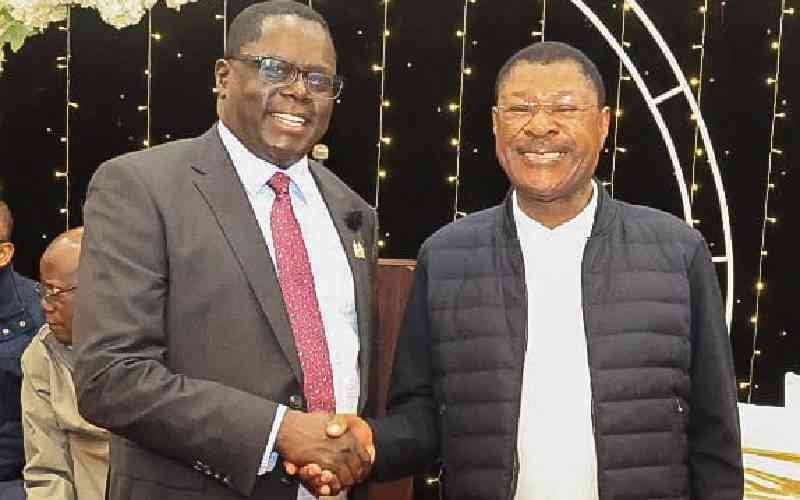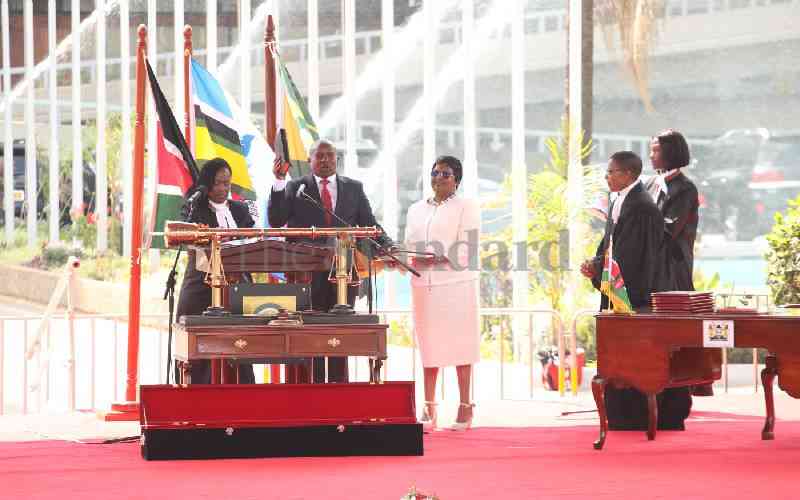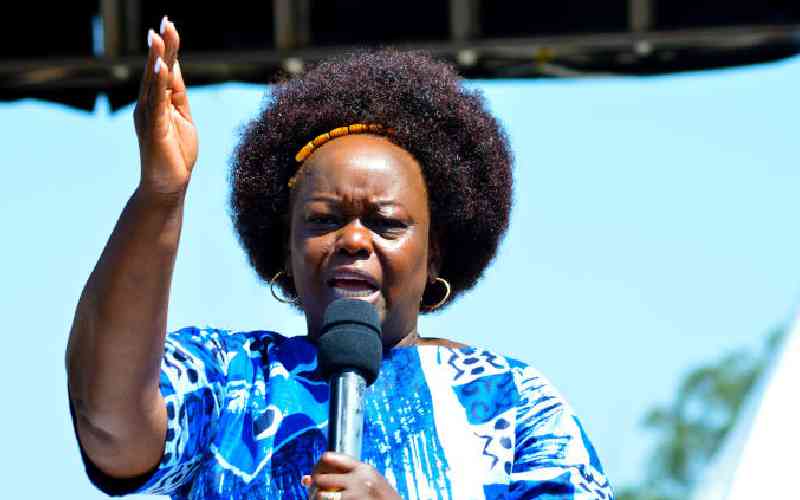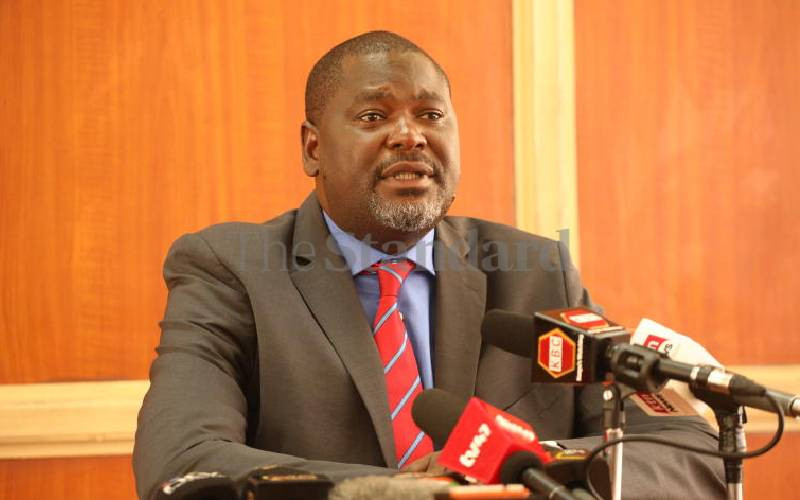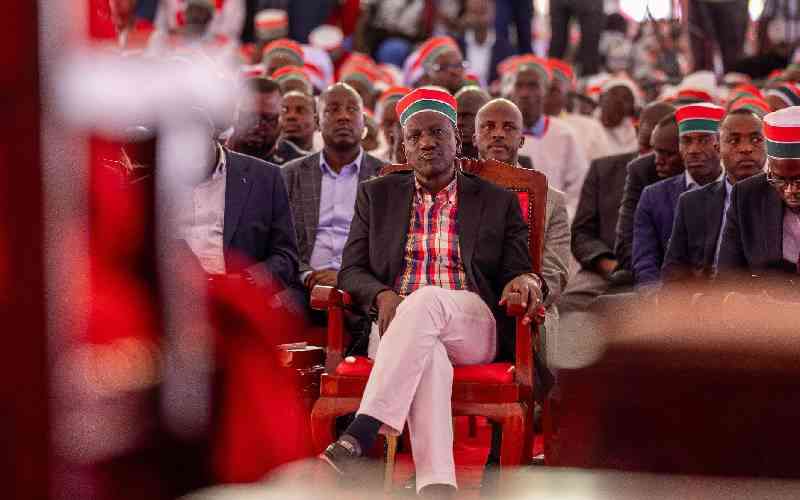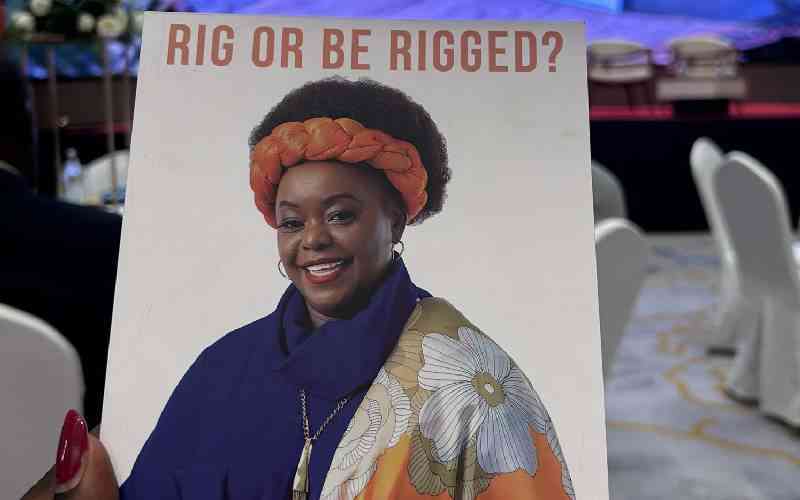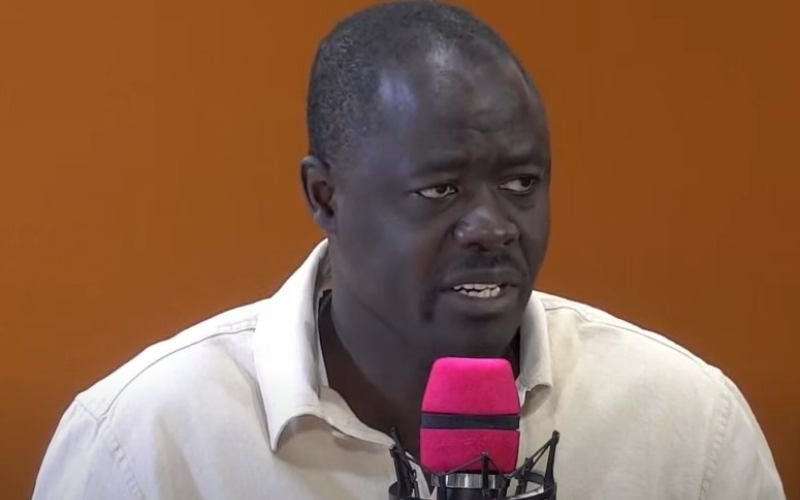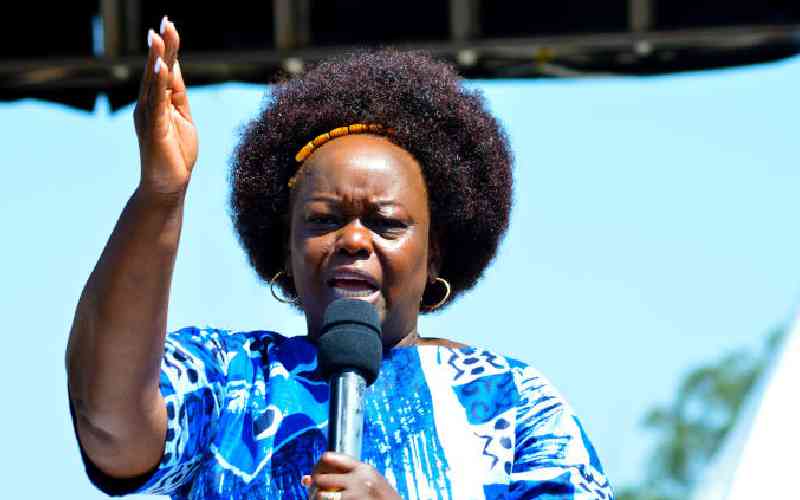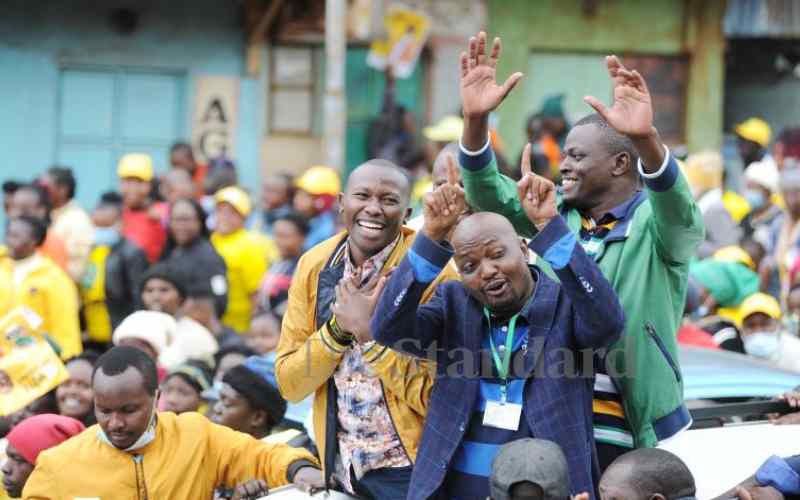
Njuguna Wanjiku, Moses Kuria and Ndindi Nyoro celebrate after poll win in Kiambaa. [John Muchucha, Standard]
Men are so simple, and so much creatures of circumstances that the deceiver will always find someone ready to be deceived.
Niccolo Machiavelli
There is no doubt that the outcome of last Thursday’s by-elections in Kiambaa Constituency and Mugaga Ward of Kiambu County gave no bragging right to either President Uhuru Kenyatta’s Jubilee Party or Deputy President’s United Democratic Alliance (UDA).
It is equally true that whilst the rise of the Hustler Nation in Central Kenya is now undeniable, the results, however, show the ascent may not be irreversible. Precisely because UDA wanted the Kiambaa seat so badly, it is just as well that it won and Ruto should be saluted for running a well-organised and focused campaign.
Given the narrow margin of UDA’s victory, it is easy to discern that Jubilee Party should have carried the day with a comfortable majority if only President Uhuru had taken three days off from his busy schedule to go and reconnect with his people and reassure them of his good intentions and plans as his retirement beckons.
There are two gratifying things for Jubilee’s supporters about these results. First, the hurricane that seemed inevitable a fortnight before the elections did not land on the shores of Kiambaa. Secondly, towards the by-election day the messaging of Jubilee Party started to gain traction which explains the deviation of the impending hurricane.
Yet in making these observations pundits should not downplay other equally significant basic facts. In truth, the two contests were all about two trophies, one bigger than the other. In winning the fierce contest for Kiambaa Constituency, Ruto’s party won the bigger trophy whilst Uhuru’s party got its consolation with the lesser trophy of victory in the contest for Muguga Ward. As expected, the two by-elections were notable for their significance to the rising Hustler Nation but we should not begrudge the victory of the respective candidates–Njuguna Wanjiku of UDA in Kiambaa and Jubilee’s Mung’ara Githinji in Muguga.
Going by those results, all indications are that as the Kenyatta succession gathers momentum the fight between Jubilee and UDA for the hearts of central Kenya is going to be protracted and could easily turn nasty and brutish. The point in all this is that going forward the party best placed to win this vicious war is the one that will better understand the socio-economic and political dynamics at play and learns the real lessons of last Thursday’s by-elections results. In the political contest between Uhuru and Ruto, the results are significant in three major respects.
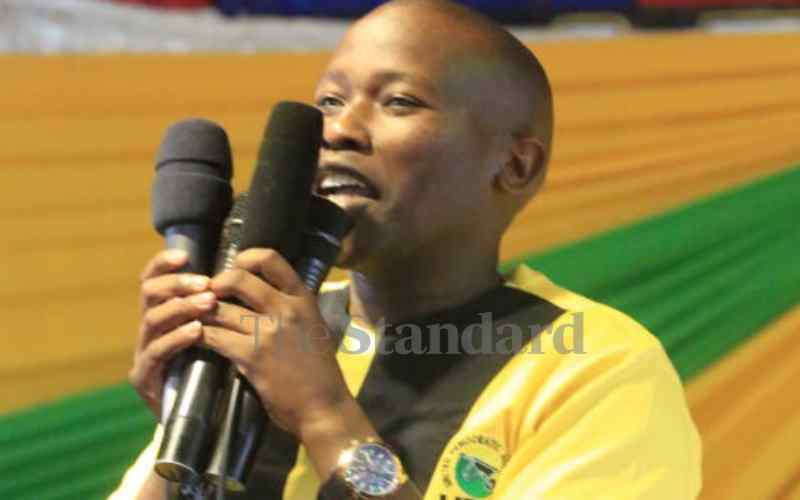
Njuguna Wanjiku of UDA in Kiambaa. [George Njunge, Standard]
For starters, it is critical to remember the obvious fact that Uhuru is the incumbent President whilst Ruto is his serving deputy. Recalling that in the 2002 presidential race, Kiambaa Constituency voted for Uhuru and Kanu candidate Njenga Karume whilst the overwhelming majority in Central Kenya voted for Mwai Kibaki and the NARC party, it should be concerning that barely two decades later the same constituents have voted against Jubilee Party.
This kind of political fight in which a deputy takes on the boss and actually wins is unprecedented across the world. In fact, given that Kenya’s 2010 Constitution embodies the US–type of presidential system, Americans would be both amazed and impressed by the guts and daring of Dr Ruto.
Secondly, the two by-elections were staged in Uhuru’s home county. On this side of planet Earth, regional political leaders do not lose elections in their backyards let alone the jewels of their political bases. Difficult as it may be, it should be readily admitted that UDA’s victory in Kiambaa, in the wake of its losses in Kabuchai and Bonchari in Bungoma and Kisii counties, respectively, is acutely painful and embarrassing to majority of people in central Kenya. No wonder one angry resident of this region described those who voted for UDA as “ngati cia Kiambu” (the home guards of Kiambu).
Thirdly, the results of the two by-elections imply that Ruto’s scheme for a hostile political takeover of central Kenya from Uhuru–which was first tested in the 2017 Jubilee Party’s nominations–could actually succeed in the coming General Election whether or not he will win the presidency. Part of the reason for this is that as the political season prescribed by law draws closer, the ascendant UDA might excite more passionate and enthusiastic support in central Kenya than the declining Jubilee Party. Yet the spectre of Ruto’s hostile takeover depends on the answer to this question: Does President Kenyatta and his advisers have the imagination, passion and energy to confront the Hustler Nation and win the war for political support in central Kenya?
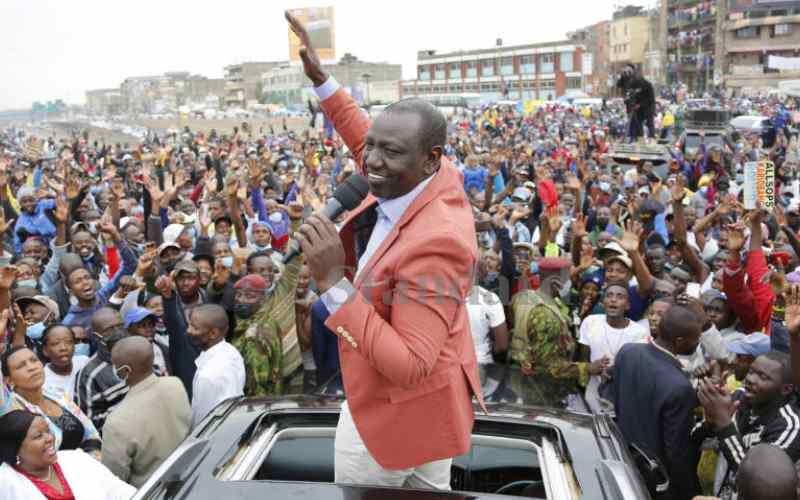
Deputy President William Ruto in Kariobangi, Mathare, Nairobi County. [DPPS]
On this front, it is not easy to feel confident about Uhuru’s team and their strategies; I have three reasons for these reservations. First, unlike ODM leader Raila Odinga and his deputy Ruto, leave alone Kalonzo Musyoka and Musalia Mudavadi, Uhuru has been peculiarly unable to reconcile his twin obligations as the political supremo of central Kenya and his obligations as president of Kenya.
Needlessly, Uhuru is instinctively inclined to view showing some love and affection for his political base as conflict with his status as president. Consequently, one of the most notable grumbles about Uhuru is his failure to return the love of the people that elected him thrice to the presidency. On this reckoning, since love must always have an object, it should not surprise him when Ruto wins the love and affection of his abandoned flock.
As the fortunes of Jubilee Party dwindle in central Kenya, Uhuru’s political leverage will increasingly depend on factors over which he has no full control, the most crucial being the election calendar, fidelity of his new-found political allies who are his erstwhile political rivals, and whether in its judgement on August 20 the Court of Appeal will rescue the BBI process from the doldrums of illegality. At the heart of these three factors is the outcome of the BBI appeal. For better or for worse, the political stalemate engendered by the outcome of the Kiambu by-elections makes the judgement of the BBI appeal absolutely critical.
From a legal standpoint, the said judgement will determine whether the political transition will be mediated by the 2010 Constitution as it exists or as it is proposed to be amended by the pending referendum. Similarly, the nature of the political alliances being forged will depend on the nature and size of the national executive which the BBI Constitutional Amendment Bill, 2020 seeks to fundamentally change by creating the positions of prime minister, two deputy prime ministers and the office of the leader of the official opposition.
Politically, unless Uhuru will be able to block the ascendancy of the Hustler Nation, all pointers are that under the existing Constitution Ruto will be best placed to become Kenya’s fifth president with or without a run-off. It should be obvious that if Ruto becomes Kenya’s fifth president on the back of the Hustler Nation this would portend the permanent exit of Kalonzo and Raila from national politics, which tragically includes the generation of Paul Muite, Kiraitu Murungi and James Orengo.
In real terms, such a victory for Ruto portends the emergence of Uganda’s Yoweri Museveni-type of permanent presidency dominated by king lion in a court full of cats and dogs. This is a sure recipe for dictatorship and it should concern everyone who wants Kenya to remain a free country for our children.
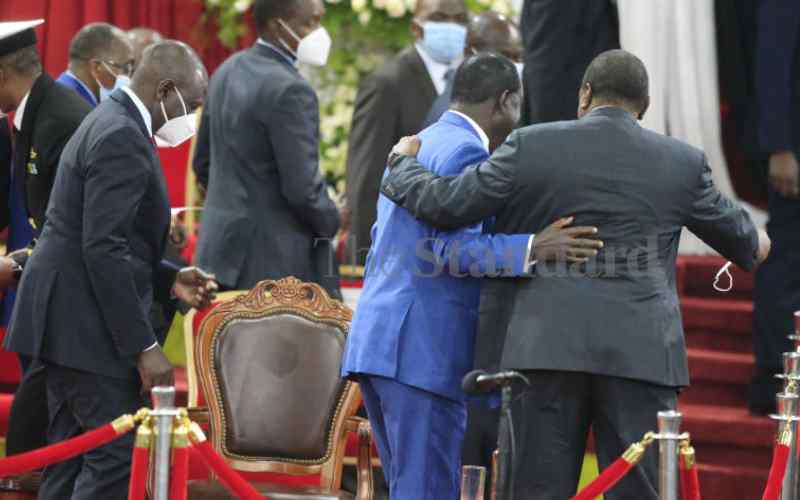
President Uhuru Kenyatta, DP William Ruto and former Prime minister Raila Odinga exit Bomas of Kenya after the launch of the BBI Taskforce Report, October 26, 2020. [Stafford Ondego, Standard]
Finally, all Kenyans must reckon with the fact that Uhuru is on his way out of the ship of the State and should start preparing for life after Uhuru. Whilst it is truly surprising that the new generation of central Kenya leaders bask in the glory of playing second fiddle, it bears noting that more and more people in this region are seeking political refuge in the Hustler Nation even as they confess deep anxieties in Ruto’s past and trustworthiness. For the benefit of Raila and other rivals of Ruto in the next election, this point deserves some emphasis.
My interactions with subscribers to the Hustler Nation–whether elites, proletariat, peasants, schooled or semi-schooled–give me the impression that they support Ruto despite the fact that they readily admit he may not be a good man.
They are, however, quick to point out that his competitors may be less bad but not good themselves. Some of them are blunter: they would rather a thief who shares the loot with them than misers who would rather receive pennies from their subjects. How can we then reconcile this seemingly conflicting attitude of the Hustler Nation’s members?
The way I see it is that as 2022 draws closer, Uhuru, Raila, Kalonzo and Musalia will have to read Niccolo Machiavelli’s The Prince again and probably get a solid intellectual to explain its application in a religious, agrarian country like Kenya with millions of peasants and semi-educated citizens. Concerning Uhuru and Ruto, there are three lessons that both of them seem to understand besides the obvious one of knowing your protagonist, whether friend or foe.
The first lesson is about Uhuru’s decision to abandon Ruto and embrace Raila in the wake of the 2017 General Election. According to Machiavelli, a prince should honour his word but so long as it serves his ends. In his words, “a prudent ruler cannot, and must not honour his word when it places him at a disadvantage and when the reasons for which he made his promise no longer exist.
If all men were good, this precept would not be good, but because men are wretched creatures who would not keep their word to you, you need not keep your word to them. And no prince ever lacked good excuses to colour his bad faith”.
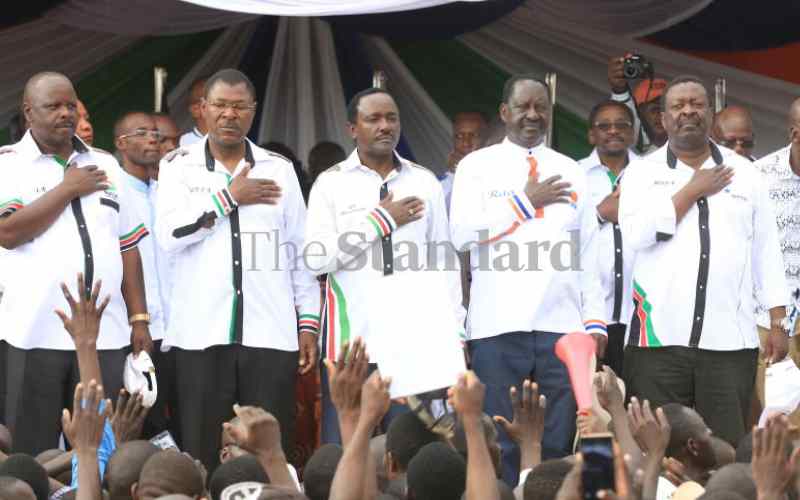
NASA principals Isaac Ruto, Moses Wetangula, Kalonzo Musyoka, Raila Odinga and Musalia Mudavadi during a past rally in Nairobi. [Beverlyne Musili, Standard]
Secondly, Machiavelli advised the prince about the need to appear, but not actually to be, “compassionate, faithful to his word, kind, guileless and devout”. In particular, Machiavelli emphasised the quality of appearing to be religious to the masses precisely because simple people tend to be religious also and I hasten to add that they are the majority in modern democracies.
In my opinion, Christianity has a tighter grip on the people of central Kenya than in other regions of Kenya. Little wonder then that Ruto easily connects with them. What would it cost Uhuru and Raila to set aside four hours every Sunday to connect with these people?
Thirdly, Machiavelli wrote that a wise ruler should cultivate a reputation for generosity and parsimony even as he knows that too much generosity could easily bankrupt him. There is no contradiction here. Machiavelli explains that if you are already a prince (read Uhuru) it is more prudent to be a miser otherwise, like former President Moi, you could easily bankrupt the State to maintain your reputation for generosity.
However, a man on his way to becoming a prince (read Ruto and Raila) cannot afford to be viewed by the people as a miser. The point is that in ostentatiously lavishing goods to the needy and the expectant such as priests and bishops you will be viewed as generous by the overwhelming majority that will never experience your generosity themselves. Thus every member of the Hustler Nation will never receive a wheelbarrow or one red cent from Ruto but they sing themselves hoarse about his generosity.
For now, it’s obviously convenient that I should pen-off.
-The writer is a constitutional lawyer ([email protected]).
 The Standard Group Plc is a multi-media organization with investments in media platforms spanning newspaper print
operations, television, radio broadcasting, digital and online services. The Standard Group is recognized as a
leading multi-media house in Kenya with a key influence in matters of national and international interest.
The Standard Group Plc is a multi-media organization with investments in media platforms spanning newspaper print
operations, television, radio broadcasting, digital and online services. The Standard Group is recognized as a
leading multi-media house in Kenya with a key influence in matters of national and international interest.

